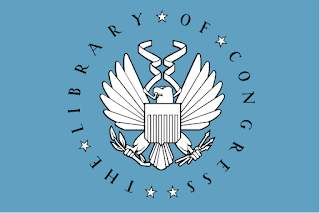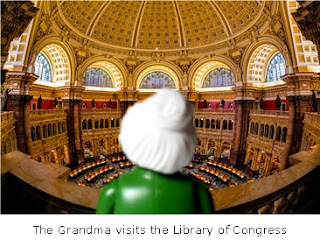The Library of Congress (LC) is the research library that officially serves the United States Congress and is the de facto national library of the United States. It is the oldest federal cultural institution in the United States.
The library is housed in three buildings on Capitol Hill in Washington, D.C.; it also maintains a conservation center in Culpeper, Virginia.
The library's functions are overseen by the Librarian of Congress, and its buildings are maintained by the Architect of the Capitol.
The Library of Congress is one of the largest libraries in the world. Its collections are universal, not limited by subject, format, or national boundary, and include research materials from all parts of the world and in more than 450 languages.
Congress moved to Washington, D.C., in 1800 after holding sessions for 11 years in the temporary national capitals in New York City and Philadelphia. In both cities, members of the U.S. Congress had access to the sizable collections of the New York Society Library and the Library Company of Philadelphia.
The small Congressional Library was housed in the United States Capitol for most of the 19th century until the early 1890s.
Most of the original collection was burnt by the British during the War of 1812, with the library beginning efforts to restore its collection in 1815.
The library purchased Thomas Jefferson's entire personal collection of 6,487 books, and its collection slowly expanded in the following years, although it suffered another fire in its Capitol chambers in 1851. This destroyed a large amount of the collection, including many of Jefferson's books.
More information: Library of Congress
After the American Civil War, the importance of the Library of Congress increased with its growth, and there was a campaign to purchase replacement copies for volumes that had been burned. The library received the right of transference of all copyrighted works to deposit two copies of books, maps, illustrations, and diagrams printed in the United States. It also began to build its collections.
Its development culminated between 1888 and 1894 with the construction of its own separate, large library building across the street from the Capitol. Two additional buildings have been constructed nearby to hold collections and provide services, one in the 1930s and one in the 1970s.
The library's primary mission is to research inquiries made by members of Congress, which is carried out through the Congressional Research Service. It also houses and oversees the United States Copyright Office. The library is open to the public for research, although only high-ranking government officials and library employees may check out books and materials.
James Madison of Virginia is credited with the idea of creating a congressional library, first making such a proposition in 1783.
The Library of Congress was subsequently established on April 24, 1800, when President John Adams signed an act of Congress also providing for the transfer of the seat of government from Philadelphia to the new capital city of Washington.
President Thomas Jefferson played an important role in establishing the structure of the Library of Congress.
On January 26, 1802, he signed a bill that allowed the president to appoint the librarian of Congress and establishing a Joint Committee on the Library to regulate and oversee it. The new law also extended borrowing privileges to the president and vice president.
In August 1814, after routing an American militia at Bladensburg, the British bloodlessly occupied Washington, D.C. In retaliation for the American destruction of Port Dover, the British ordered the destruction of numerous public buildings in the city.
British troops burned the Library of Congress, including its collection of 3,000 volumes. These volumes had been held in the Senate wing of the Capitol. One of the few congressional volumes to survive was a government account book of receipts and expenditures for 1810. It was taken as a souvenir by British naval officer Sir George Cockburn, whose family returned it to the United States government in 1940.
On December 24, 1851, the largest fire in the library's history destroyed 35,000 books, about two–thirds of the library's collection and two-thirds of Jefferson's original transfer.
Congress appropriated $168,700 to replace the lost books in 1852 but not to acquire new materials. By 2008, the librarians of Congress had found replacements for all but 300 of the works that had been documented as being in Jefferson's original collection.
More information: Pentagram
In 1859, Congress transferred the library's public document distribution activities to the Department of the Interior and its international book exchange program to the Department of State.
The Library of Congress contents:
-American Memory created in 1990, which became The National Digital Library in 1994. It provides free access online to digitized American history and culture resources, including primary sources, with curatorial explanations to support use in K-12 education.
-thomas.gov website launched in 1994 to provide free public access to U.S. federal legislative information with ongoing updates; and congress.gov website to provide a state-of-the-art framework for both Congress and the public in 2012;
-The National Book Festival, founded in 2000 with First Lady Laura Bush, has attracted more than 1000 authors and a million guests to the National Mall and the Washington Convention Center to celebrate reading. With a major gift from David Rubenstein in 2013, the library established the Library of Congress Literacy Awards to recognize and support achievements in improving literacy in the U.S. and abroad;
-Open World Leadership Center, established in 2000, by 2015 this program administered 23,000 professional exchanges for emerging post-Soviet leaders in Russia, Ukraine, and other successor states of the former USSR. Open World began as a Library of Congress project, and later was established as an independent agency in the legislative branch.
-The Veterans History Project, congressionally mandated in 2000 to collect, preserve, and make accessible the personal accounts of American war veterans from WWI to the present day;
-The National Audio-Visual Conservation Center opened in 2007 at a 45-acre site in Culpeper, Virginia, established with a gift of more than $150 million by the Packard Humanities Institute, and $82.1 million in additional support from Congress.
Since 1988, the library has administered the National Film Preservation Board. Established by congressional mandate, it selects American films annually for preservation and inclusion in the new National Registry, a collection of American films.
The library has made these available on the Internet for free streaming.
More information: Twitter-Library of Congress
By 2015, the librarian had named 650 films to the registry. The films in the collection date from the earliest to ones produced more than ten years ago; they are selected from nominations submitted to the board.
-The Gershwin Prize for Popular Song, was launched in 2007 to honor the work of an artist whose career reflects lifetime achievement in song composition. Winners have included Paul Simon, Stevie Wonder, Paul McCartney, Burt Bacharach and Hal David, Carole King, Billy Joel, and Willie Nelson, as of 2015. The library also launched the Living Legend Awards in 2000 to honor artists, activists, filmmakers, and others who have contributed to America's diverse cultural, scientific, and social heritage;
-The Fiction Prize, now the Library of Congress Prize for American Fiction, was started in 2008 to recognize distinguished lifetime achievement in the writing of fiction.
-The World Digital Library, established in association with UNESCO and 181 partners in 81 countries in 2009, makes copies of professionally curated primary materials of the world's varied cultures freely available online in multiple languages.
-National Jukebox, launched in 2011, provides streaming free online access to more than 10,000 out-of-print music and spoken word recordings.
-BARD was started in 2013; it is a digital, talking books mobile app for Braille and Audio Reading Downloads, in partnership with the library's National Library Service for the blind and physically handicapped. It enables free downloads of audio and Braille books to mobile devices via the Apple App Store.
More information: USG
a place where history comes to life.
Norman Cousins



No comments:
Post a Comment